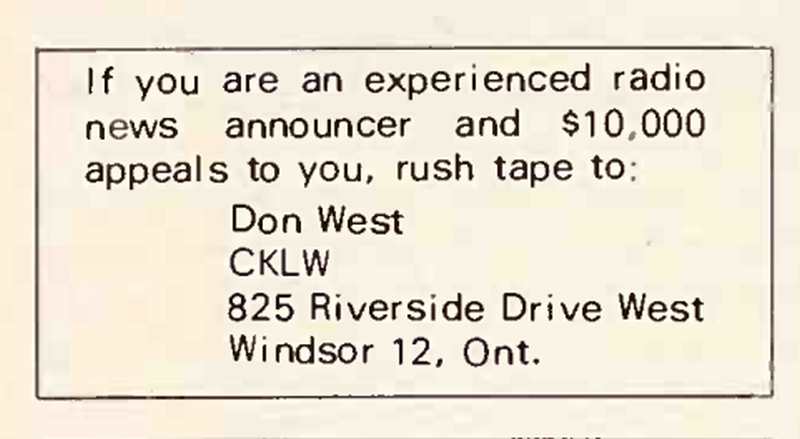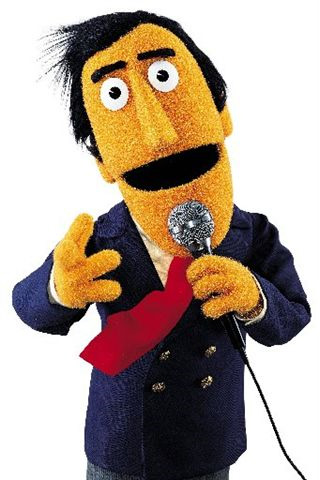- RadioActive
- Moderator
 Offline
Offline
They Still Offer College Courses In Broadcasting. But Is Anyone Going?
I remember when I got into the-then highly competitive course for Radio and Television Arts at Ryerson, back before it was renamed. I have friends who went to Humber's radio program. And I've worked with people who attended Fanshawe in London or Canadore College in North Bay.
That was a long time ago. And while getting in amidst the competition at the time was a thrill, I have to admit I learned more in one month at a real radio station than I did in three years at Ry High.
Which brings me to this: with the state of radio being what it is and a younger generation that presumably doesn't listen much to the medium at all anymore, are these courses still attracting anyone? I looked through their websites before posting this and yep, they all still exist. So I assume someone is filling those seats. But how long can these kinds of courses continue when broadcasting jobs are disappearing at an alarming rate and much of the business has been taken over by streaming and podcasting - and many of the people doing those forms of media pretty much learned by themselves?
Can these courses that were once so hard to get into possibly survive an indifferent generation? Does anyone here have kids or relatives who would make this their major?
(And by the way, the site at Metropolitan Toronto University - formerly known as Ryerson - says it sends students to L.A. for placements and "boot camps." They sure never did that when I was there!)
MTU RTA
Humber College Radio Broadcasting
Fanshawe College Radio & Media Production
Canadore College Broadcasting, Television and Video Production
- BowmanvilleBob
- Member
 Offline
Offline
Re: They Still Offer College Courses In Broadcasting. But Is Anyone Going?
Mohawk College in Hamilton suspended its journalism program last year due to low enrollment and less than stellar numbers in terms of graduates getting media-related jobs. A number of schools are rethinking their media programs, emphasizing freelance and online work opportunities.
"Gina Lorentz, co-ordinator of broadcast journalism at Fanshawe College, said journalism skills are transferable into fields outside of news media, including in digital and corporate communications and the non-profit sector. As a result, journalism programs are highlighting freelancing skills and teaching students how to work independently, Lorentz and other media educators said. Schools are also teaching students how to create digital content on multiple platforms, including social media and podcasts, they said.“Those newsrooms of the past don’t exist anymore,” Lorentz said. “So it really is about providing them the experience, the knowledge that they need to make it in what is a new way of looking at our industry.”
Colleges/universities rethinking journalism courses in light of layoffs
Last edited by BowmanvilleBob (March 10, 2024 11:24 am)
- Saul
- Member
 Offline
Offline
Re: They Still Offer College Courses In Broadcasting. But Is Anyone Going?
BowmanvilleBob wrote:
Mohawk College in Hamilton suspended its journalism program last year due to low enrollment and less than stellar numbers in terms of graduates getting media-related jobs. A number of schools are rethinking their media programs, emphasizing freelance and online work opportunities.
"Gina Lorentz, co-ordinator of broadcast journalism at Fanshawe College, said journalism skills are transferable into fields outside of news media, including in digital and corporate communications and the non-profit sector. As a result, journalism programs are highlighting freelancing skills and teaching students how to work independently, Lorentz and other media educators said. Schools are also teaching students how to create digital content on multiple platforms, including social media and podcasts, they said.“Those newsrooms of the past don’t exist anymore,” Lorentz said. “So it really is about providing them the experience, the knowledge that they need to make it in what is a new way of looking at our industry.”
Colleges/universities rethinking journalism courses in light of layoffs
We don't need journalists. we need commentators, marketers, influencers, social media gurus...
- newsguy1
- Member
 Offline
Offline
Re: They Still Offer College Courses In Broadcasting. But Is Anyone Going?
Saul Wrote:
"We don't need journalists. we need commentators, marketers, influencers, social media gurus..".
Sure, leave it to those people to go into war zones and risk their lives getting the truth out.
Leave it to them to become responsible experts in economics, the law, the English language and ethics, etc etc etc.
Yeah, I know Saul is being sarcastic.
But his comment reminds me of a scene in The Hitch hiker's Guide To The Galaxy when Ford Prefect finds himself on a planet populated by marketing gurus and security guards.
They trying to invent the wheel, and they come up with a square piece of gray stone.
Ford looks at them and says, you fools you are all doomed,to which one of the marketing consultants says with indignation, "OK smart guy, what colour would you make it?"
=12px
Last edited by newsguy1 (March 10, 2024 12:40 pm)
- Radio Bob
- Member
 Offline
Offline
Re: They Still Offer College Courses In Broadcasting. But Is Anyone Going?
As a proud Canadore grad from more years ago than I care to mention, I note that the link above proves that my alma mater no longer trains students for on-air/hosting. It is a production-only program. I applaud that because to this day, too many colleges train students for jobs that don't exist anymore. Canadore has not for several years.
- mic'em
- Member
 Offline
Offline
Re: They Still Offer College Courses In Broadcasting. But Is Anyone Going?
My son also is a Canadore graduate but decided to not pursue a broadcasting career and returned to the college to take a business course . He is now employed in the insurance industry and doing well. The Canadore studio is being leased to an actual on air radio station... 106.3 Jet Fm, formerly a Moose brand station. They announce in their promos they are broadcasting from the Canadore studios.
Last edited by mic'em (March 10, 2024 7:34 pm)
- RadioActive
- Moderator
 Offline
Offline
Re: They Still Offer College Courses In Broadcasting. But Is Anyone Going?
There definitely isn't a lot of money in getting started in the biz, if you can even find an open position. But check this out: it's a want ad from 1969 at CKLW in Windsor, one of Canada's most legendary stations and home of the equally legendary over-hyped "20/20 News."
Check out what the salary was for an opening at the Big 8. Maybe that was a lot back then, but for that amount, are you running to Windsor? My very first job, at CKEY in 1977, as a news writer/tape jockey, paid me $12,000 a year. And 'EY was no Big 8!
- •
- newsguy1
- Member
 Offline
Offline
Re: They Still Offer College Courses In Broadcasting. But Is Anyone Going?
My first full time job in radio news was 1978 in Trail, B.C.
I made 6,600 dollars a year.
But I was only there for about 10 months.
Then I got a job in Vancouver for 12 thousand a year.
Wow!
- Paul Jeffries
- Member
 Offline
Offline 
Re: They Still Offer College Courses In Broadcasting. But Is Anyone Going?
RadioActive wrote:
There definitely isn't a lot of money in getting started in the biz, if you can even find an open position. But check this out: it's a want ad from 1969 at CKLW in Windsor, one of Canada's most legendary stations and home of the equally legendary over-hyped "20/20 News."
Check out what the salary was for an opening at the Big 8. Maybe that was a lot back then, but for that amount, are you running to Windsor? My very first job, at CKEY in 1977, as a news writer/tape jockey, paid me $12,000 a year. And 'EY was no Big 8!
According to the Bank of Canada's inflation calculator, $10,000 is equal to a little over $82,000 today, and $12,000 in 1977 would be almost equal to $59,000 today. Not sure what the cost of living was in those cities in those years, but those wages seem pretty decent, if you ask me.
When I first applied for a "production cleanup" job at CHML in the early '90s (mostly dubbing commercials and music to carts), Bob Hooper mentioned something about freelancers getting paid $0.75 per cart. Not sure if he was joking or not as Hoop could be known for his dry sense of humor, but I did manage to get started with an hourly wage (which probably didn't work out to be much more than that in the long run).
PJ
ClassicHitsOnline.com...If you enjoy hearing the same 200 songs over and over again...listen to the other guys!
- RadioActive
- Moderator
 Offline
Offline
Re: They Still Offer College Courses In Broadcasting. But Is Anyone Going?
Yes, I admit I'm looking at this from the lens of 2024, not 1969, which is very different. But somehow 10 grand at a place with CKLW's reach still seems small. Hard to compare yesterday's apples to today's oranges.
- •
- RadioActive
- Moderator
 Offline
Offline
Re: They Still Offer College Courses In Broadcasting. But Is Anyone Going?
Didn't mean to leave out Conestoga College in Kitchener in my initial post, which also still has a radio course.
- •
- Brad
- Member
 Offline
Offline
Re: They Still Offer College Courses In Broadcasting. But Is Anyone Going?
I think Mohawk College suspended their radio program a few years ago to redo it. It is now called Radio and Creative Content. The course description is "Become an excellent communicator by developing engaging, creative content for on-air and online to connect with your audience."
- Paul Jeffries
- Member
 Offline
Offline 
Re: They Still Offer College Courses In Broadcasting. But Is Anyone Going?
Brad wrote:
I think Mohawk College suspended their radio program a few years ago to redo it. It is now called Radio and Creative Content. The course description is "Become an excellent communicator by developing engaging, creative content for on-air and online to connect with your audience."
I'm getting Page not found with that link.
PJ
ClassicHitsOnline.com...If you enjoy hearing the same 200 songs over and over again...listen to the other guys!
- Brad
- Member
 Offline
Offline
Re: They Still Offer College Courses In Broadcasting. But Is Anyone Going?
Sorry. Lose the period at the end:
- paterson1
- Member
 Offline
Offline
Re: They Still Offer College Courses In Broadcasting. But Is Anyone Going?
My old alma matter actually has more offerings for broadcasting than when I roamed the halls. Conestoga College in Kitchener has separate two year radio and television courses and also a one year Performance Media and Digital program. When I was there our course was 3 years for both radio and television.
Kyle Christie and Nancy Richards formerly of CTV Kitchener teach at the college.
- Peter the K
- Member
 Offline
Offline 
Re: They Still Offer College Courses In Broadcasting. But Is Anyone Going?
Conestoga Class of 85 here. Back then, the first year intake was 25-30 students and you could almost guarantee some attrition through the three years of the program as some students discovered this wasn't a bird course.
Some of our part time faculty included the likes of Phil Stone from CHUM which, quite honestly, us yougn's were just too young to appreciate. To think that we had this guy for a few hours every week and most of us at the time thought he jwas ust an old fogie who was behind the times.
If only we knew then what we eventually twigged onto we would have paid so much attention and soaked up his lectures like a sponge.
But to be honest, 3 years was an awfully long time to learn how to cue a record. ![]()
 1 of 1
1 of 1